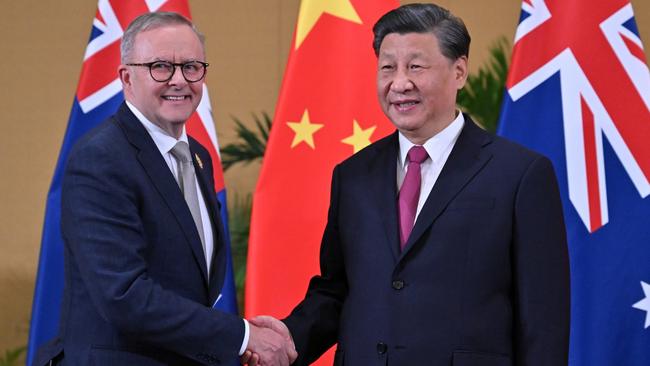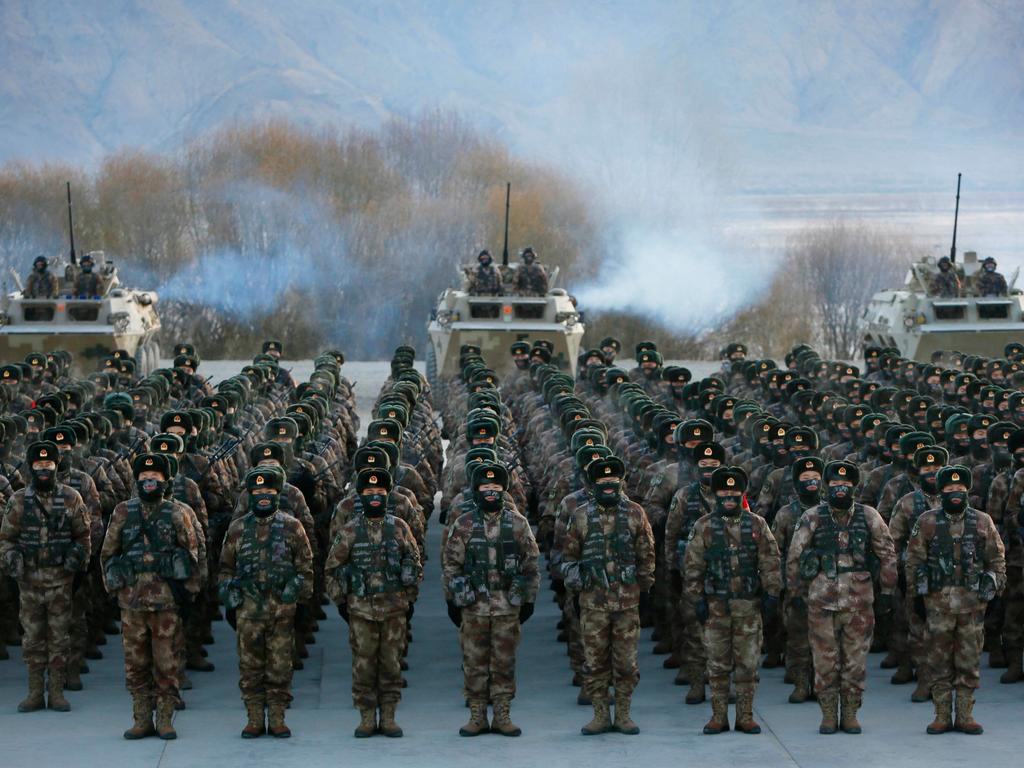Albanese juggles domestic pressures while on trip to meet Biden, Xi Jinping
Anthony Albanese says he is not embarking on international trips ‘for the sake of it’ and must advance our strategic interests and address global inflationary pressures.

Anthony Albanese says he is not embarking on international trips “for the sake of it” and must engage on the world stage to advance Australia’s strategic interests and address global inflationary pressures fanned by conflicts in the Middle East and Ukraine.
The Prime Minister is managing a gruelling international travel schedule, with five overseas trips expected over a six-week period, while juggling the domestic agenda, cost-of-living crisis, surging inflation, higher oil prices and supply chain disruptions.
As economists forecast a 13th rate hike in 18 months when the Reserve Bank meets on Melbourne Cup day, amid stubborn services inflation, higher petrol prices and historically low unemployment, Mr Albanese said “a lot of the inflationary pressure is because of global factors”.
“That’s why you have to be engaged,” he said. “(While travelling) I’m still doing all of the domestic stuff and everything else we’re getting done. We’ve got our domestic agenda. Look at what we’ve got through: all major commitments we made during the election campaign, all legislated.”
Mr Albanese, who was feted with a state visit and dinner by US President Joe Biden and who heads to Beijing on Saturday for a red-carpet welcome by Chinese President Xi Jinping, said leader-to-leader engagement was critical at a time of significant economic and security shocks.
“It’s part of the job, that international engagement, representing Australia,” he said. “It would be easier to not. There’s been no international visits for the sake of it. They’ve all been hard work.”
Mr Albanese told The Australian that the government was maintaining its laser-focus on relief for households, including cheaper childcare, tripling bulk billing from Wednesday and “measures across the board aimed at cost of living”.
He said he was “doing both” domestic and international work while travelling and pointed to Microsoft’s $5bn investment in Australia and critical minerals deals that would support “jobs and upskilling”: “Coming here (to Washington) helped get that across the line.”
Mr Albanese, who travelled to Washington a week after the voice referendum defeat, is determined to keep lines of communication open with Beijing amid unprecedented strategic competition between the US and China.
The Prime Minister has invoked the Cold War and Cuban missile crisis to support his deep belief that open, constructive dialogue with China will “build understanding” and avoid “misadventure”.
Mr Albanese, who spoke of the need for “guardrails” in his June Shangri-La Dialogue speech, said during the US-Soviet Union competition, there was communication between them including at the military level.
“What you don’t want to happen is misadventure through, something happens, then there’s the response. You don’t want that,” he said.
Mr Albanese’s trip to China, which includes meetings with Mr Xi and Premier Li Qiang in Beijing and attending the China International Import Expo in Shanghai, marks the first visit to the country since Malcolm Turnbull in 2016.
It will also commemorate the 50th anniversary of Gough Whitlam’s historic visit that led to an explosion in trade. After arriving back in Australia on November 7, the day the RBA meets, Mr Albanese heads to the Cook Islands the next day for the Pacific Islands Forum. The following week he jets to San Francisco for the APEC summit, where Mr Biden and Mr Xi are expected to meet. The Australian understands Mr Albanese will likely travel to Dubai for the COP28 leaders’ summit in early December to push Australia’s bid to host a UN climate change conference with South Pacific nations.
Following a week of high-level meetings in Washington, including “two dinners in a row at the White House”, Mr Albanese said the US side was positive about the outcomes of the state visit despite public warnings from the Biden administration about fully trusting China.
On his final day in Washington, Mr Albanese delivered a speech to anxious US officials stressing that Australia was “clear-eyed” about its efforts to stabilise relations with Beijing and reiterated the government’s approach to China had been “patient, calibrated and deliberate”.
He said reopening the barley and wine markets for local producers was “huge”, with barley exports worth $900m and wine valued at more than $1.2bn annually.
“That’s jobs … that’s economic activity coming in,” he said, confirming China’s barley ban reversal was “already making a difference”, with exports back in the market and contracts signed.
With Australian and US national security chiefs warning this month about China’s coercion tactics, industrial-scale intellectual property theft, clashes with Philippine vessels and military intimidation, Mr Albanese said “we’ve not changed our position on any of those issues and we talk straight”.
“But engaging is a positive thing and when you look at the economic relationship … (it’s) 25 per cent of our exports. And you look at the equivalent of it’s more than two, three and four – Japan, Korea, the US – and China’s larger than those three combined,” he said.
“It makes sense to engage, it makes sense as well to develop understanding.”
After the Department of Prime Minister and Cabinet this month released its review into the Port of Darwin and found that Chinese-owned Landbridge could remain its operator, Mr Albanese said his government would intervene if rules and guidelines were not followed.
The review, which was done at “arm’s length”, “doesn’t change my view about the original decision at all … But they did the assessment, the same assessment that the former government found as well. Came back and said the regulations are enough that are in place.”
Mr Albanese said the deep personal relationship between Mr Biden and Mr Xi, which traces back years, was a positive as the US and China engage in a strategic battle for supremacy from which neither will back down.
He said visits to China by Foreign Minister Penny Wong and Trade Minister Don Farrell, as well as Defence Minister Richard Marles meeting his counterpart, were positive. “Everything in international relations can be complex but we’re being clear about our views about a range of issues including Cheng Lei (the Australian journalist released by Chinese authorities after years of detention). That was a positive outcome that went through those processes,” Mr Albanese said.
“The removal of many of the trade impediments. Timber, barley, hay … wine is on the way there … is positive. China is a large economy, it trades with all the countries in our region as well.
“The point I’ve made is the impediments to our trade were limiting Australia’s income and economic activity but not assisting China. It’s in China’s interests to get access to our wine, our seafood, our meat, our products.
“We haven’t made any change to our view of a range of areas where there are differences, but we haven’t attempted to use international relations for domestic purposes to send messages. We’ve used diplomacy.
“Diplomacy works.”







To join the conversation, please log in. Don't have an account? Register
Join the conversation, you are commenting as Logout